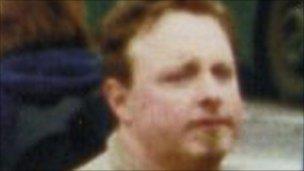Undercover police work revealed by phone blunder
- Published

The undercover officer spent four years taking part in the activities of the Globalise Resistance group
A blunder by an undercover policeman has revealed how the Metropolitan Police spied on the private lives of members of an anti-capitalist group.
Newsnight has obtained an audio tape in which the officer is heard discussing the personal lives of Globalise Resistance activists with other police.
Calling himself Simon Wellings, he infiltrated the group from 2001-2005.
In January, Newsnight uncovered the story of Pc Mark Kennedy, who spent years posing as a climate activist.
This tape will reinforce concerns about the operations of undercover police generated by the unmasking of Mr Kennedy.
Call diverted
The conversation involving Mr Wellings took place in 2005, and was recorded when the officer accidentally telephoned another of the group's members without knowing he had done so.
The other member failed to pick up, so the call was diverted to their answer phone, which then recorded the conversation.
In what sounds like a police station we hear the officer apparently going through photographs of Globalise Resistance demonstrators with a colleague.
Mr Wellings identifies those he can and gives personal information about them, including their sexual orientation.
At one point, for instance, he tells the other officer: "She's Hannah's girlfriend - very overt lesbian - last time I saw her, hair about that long, it was blonde, week before it was black."
Guy Taylor, from Globalise Resistance, complains that the information is "very personal and nothing to do with the political outlook of our group".
The Wellings tape also suggests that such information is fed to CO11, the Met Police unit which deploys Forward Intelligence Teams (FITs) to photograph demonstrators.
At one point the other officer is heard pressing Wellings for more names:
"Thing is, we've got the CO11s. They're like, 'Who are these people? Do you know who they are? Have you just photographed them?'"
Names to faces
Emily Apple of Fitwatch, which monitors the CO11 FITs, says similar scenes will have been going on this week in police control rooms around London as undercover police meet their handlers to identify protesters ahead of Saturday's TUC march against government cuts.
"Ahead of tomorrow's demonstration, they will be going through photographs trying to put names to faces and identify who they want to put on their spotter cards."
Ms Apple estimates that there could be as many as a dozen secret police among the marchers.
Mr Wellings was a Globalise Resistance activist from 2001 to 2005 and participated in protests everywhere from New York to Seville.
Mr Taylor says that, in retrospect, Mr Wellings "didn't have much of a back story - we never met any of his friends or his family from outside Globalise Resistance".
At the time they were not suspicious and he even became the official photographer of the group as they went to demonstrations in different countries.
But then Mr Wellings fell victim to the mistake which many mobile phone owners have made at some time - the accidental phone call.
Mr Taylor said the group then confronted him: "We just said, "You've been rumbled, it's time for you to leave the group.'"
Mr Wellings then vanished without trace.
"He had plenty of photographs of us," said Mr Taylor of their former official photographer, "but we had very few of him".
The Met Police told Newsnight on Friday that "the use of undercover officers is a valuable tactic in the fight against crime and disorder to keep people and communties safe".
- Published7 February 2011
- Published18 January 2011
- Published11 January 2011